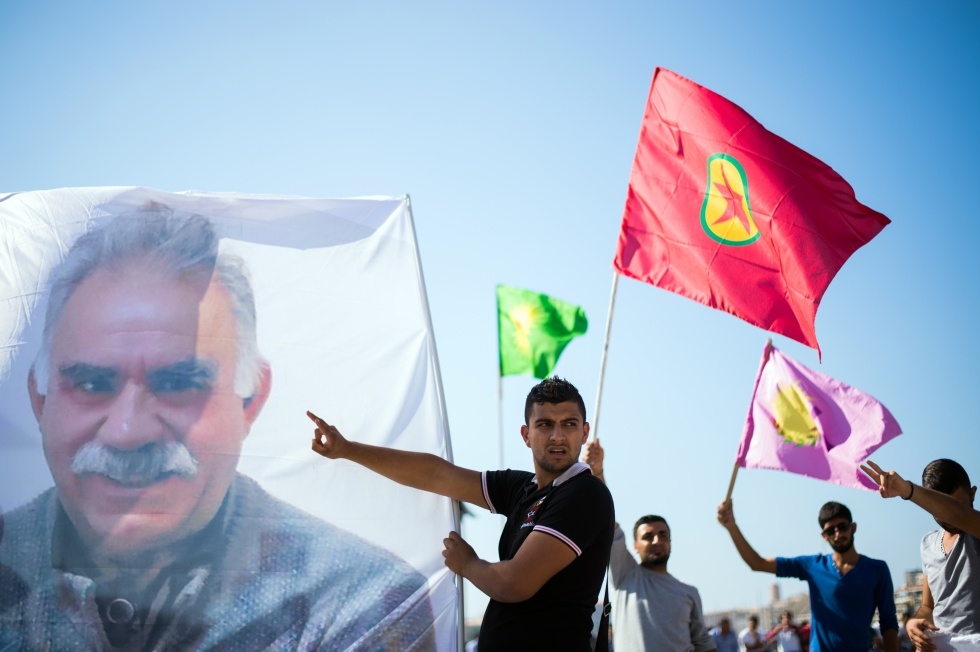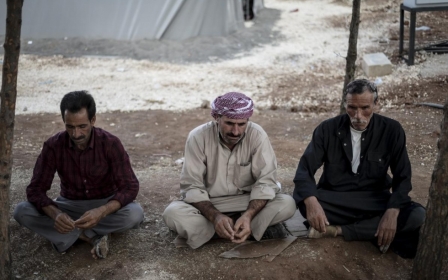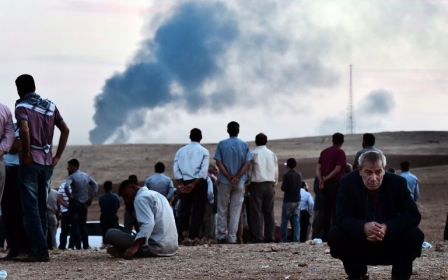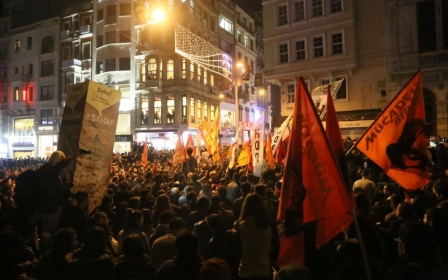Turkish-PKK peace process on brink after airstrikes

ERBIL, Iraq - For the first time in nearly two years, Turkey carried out airstrikes against positions of the Kurdistan Workers Party (PKK) close to the Turkish-Iraqi border, prompting speculation that peace talks could disintegrate.
The strikes took place in Daglica, in the mountainous province of Hakkari, late on Monday, although they were only announced on Tuesday.
The Turkish military said that it carried out the strikes in response to a PKK raid on a Turkish military base, but irrespective of who fired first, the strikes have worked to reignite tensions between the government and the country’s Kurdish population, and may spark further violence. According to the latest reports, the peace process is now on the brink and could collapse Wednesday.
Nilufer Koc, co-chair of the Kurdistan National Congress - an umbrella organisation for various Kurdish parties in the region, told Middle East Eye on Tuesday that jailed PKK leader Abdullah Ocalan had asked Turkish authorities to “respond by tomorrow [Wednesday] since the army is attacking us.”
“Erdogan should explain if he lost control over the state, or if it’s the Turkish aim to block the whole political procedure which has been going on for three years,” she added.
After more than 30 years of conflict, Ocalan declared the end of armed struggle in 2013 and announced that a ceasefire agreement had been penned with Ankara. The move raised hopes that a settlement might end decades of violence, but tensions in neighbouring Syria have since strained relations, with Tuesday’s airstrike possibly pushing the peace process on the verge of a breakdown.
The airstrikes come two weeks after Ocalan first lashed out at Turkey for not helping Kurdish forces battling IS militants in the Syrian border town of Kobane. The main Kurdish demand has been for Turkey to open up its borders to Turkish Kurds for support and humanitarian aid to their brethren in Kobane.
"If this massacre attempt achieves its goal it will end the process," Ocalan warned.
His comments came as Turkish lawmakers worked to lay the legal framework for intervention in Syria and apparently began considering whether or not to send in ground troops and let foreign powers use military bases in Turkey to fight IS.
A lightening advance by IS has prompted concern that a massacre against Kurdish civilians in Kobane could be looming, leading the UN envoy to Syria to last week call on Turkey to allow the PKK to send Kurdish fighters across the border.
Despite mounting US and international pressure and some concessions from Turkey, President Turkish President Recep Tayyip Erdogan has as of yet to commit Turkish troops, or more controversially, open up the border to allow PKK fighters in.
The Turkish relationship with the PKK remains fragile and days before the UN’s call on 10 October, Turkey sealed the border with Syria near Kobane and arrested wounded PKK commanders who had crossed over to fight IS and defend Syria’s Kurds.
Syria spillover
The events on the border have also been resonating throughout much of southeastern Turkey.
Turkish President Recep Tayyip Erdogan has long been accused by his critics of - at the very least - turning a blind eye to Islamic State.
“The people have been fighting for one month and the [Islamic State], backed by Turkey, has not even occupied Kobane,” Koc said. “Turkey should take a lesson from this.”
Erdogan strongly denies the allegations, but tensions boiled over on 7 October after he warned that Kobane was “about to fall”.
Shortly after his speech, made to a crowd of Syrian refugees in southern Turkey, pro-Kobane protests broke out. Buildings were set on fire as largely Kurdish protesters clashed with police in violent demonstrations that prompted curfews to be set up in some cities. Over the next two days, according to local Turkish media reports, 35 protesters were killed.
Kurdish politicians in Iraq, one of Turkey’s main trade partners, have also harbored suspicions that IS is being backed by the Turkish government and have been holding negotiations with Syrian Kurds in Duhok in Iraqi Kurdistan over how best to fight the militant fighters.
Turkey points out that it has helped the Kurds by hosting more than a million Syrian refugees - including more than 160,000 largely Kurdish refugees who have fled from northern Syria since mid-September. Moreover, Turkey insists that it has allowed Kurdish fighters to be treated at Turkish hospitals.
But with IS pressing ahead in Kobane, despite weeks of US-led coalition airstrikes, and the militants reportedly sending more reinforcements to Kobane, tensions threaten to boil over.
The stakes are high. If events in Syria spark further protests in Turkey, or cause the fragile peace process to break down entirely, analysts fear that Turkey itself could become destabilised.
Thus far, Turkey has made some tentative diplomatic gestures towards the Kurds and in August Turkey announced that it would launch direct talks with the PKK rebels based in the mountains of Qandil, in northern Iraq.
Many analysts, however, have warned that Turkey wouldn’t be opposed to IS and the Kurds finishing each other off if this allows Ankara to gain the upper hand in negotiations with its Kurdish minority.
“It’s a consistent approach to the conflict. And I think they are happy to have them kill each other,” Aaron Stein, a Turkey expert and a fellow at the Royal United Services Institute, told the New York Times.
Erdogan, often seen as an outspoken leader, has fanned suspicions and on 4 October, he openly announced that the PKK and IS were one and the same for Turkey.
"It is wrong to consider them in different ways ... We need to handle them all together on a common ground," Erdogan said, in what has been widely interpreted as a sign that Ankara still sees the PKK as an enemy and not a partner for peace.
However, international pressure on Ankara to make peace with the Kurds is believed to be strong and growing, with the US seeming acutely aware that the resumption of Turkish-PKK hostilities would further endanger the ability of its US-led coalition to fight IS and would exasperate existing regional instability further.
While the PKK is considered a terrorist organisation by Washington and the EU, it has been gaining credibility in recent months as it has shown itself to be effective on the ground against IS militants in Syria and also Iraq.
Syrian Kurds, allied to the PKK, were fighting IS militants for months before the US coalition against the group took off. They are seen as a key part of any future anti-IS pushback in Syria. In August, the PKK also helped to defend Erbil, the capital of the Western-allied Kurdistan region in Iraq, and it likewise helped to create a corridor for civilians from the Yezidi minority to escape an IS siege of the Sinjar mountains.
This led to calls in Europe to delist the PKK as a terrorist organisation, and the Iraqi Kurdish president Masoud Barzani personally thanked the PKK.
The region’s Kurds have not always presented a united front, but Ankara has also angered the Iraqi Kurds, a reliable trade partner for years, by not providing more assistance in the wake of the IS-led Sunni offensive that managed to take over vast swaths of Iraq in June.
At the time, Turkey argued that the hostage of their diplomatic staff prevented any help for Iraqi Kurds, but the release of the 46 hostages by IS in September has muted these objections.
“We have to be very clear with Turkey. How can we have such relations? It is in the benefit of Turkey to stand against the IS,” Fuad Hussein, the chief of staff of the Kurdistan region’s president told Rudaw.
“The IS is not a friend to any country. Turkey, at least, could help us through some of its military bases in Duhok.”
US-led airstrikes have so far shown little sign of turning back the IS tide in northern Syria or western Iraq, with Washington now warning that strikes alone are unlikely to be enough to protect Kobane.
Without a game changer on the ground, the Kurdish forces could face an almost existential threat with IS militants vowing to root out the Kurds whom they accuse of acting as a key Western ally in the region.
According to Dabiq, the official English glossy magazine of the IS, the Obama administration intervened in Iraq to save the Yazidi “devil worshippers” whom the PKK helped to save in Sinjar.
In fact, the 4th edition of Dabiq, suggests IS attacked the Syrian Kurds expecting the Obama administration to ally with the PKK in Syria, creating an unholy alliance that is backed up by un-Islamic western laws and forces.
The magazine calls the PKK the “the main ally of the crusaders” and calls for their extermination in Kobane, in light of their secular ideology, and the facts that Israel has declared themselves an ally of a future Kurdish state.
A few days before the Kobane siege, the PKK-affiliated People’s Protection Units, announced joint cooperation with the Free Syrian Army (FSA) against IS.
The PKK expected the West to need local partners on the ground in Syria to fight IS, and therefore launched an alliance with the FSA against IS, asking for Western support. But Turkey blocked armed support to moderate FSA-rebels fighting IS, after they were forced to work with the Kurds being pushed into the Kurdish areas.
But with Turkey determined to take the fight to Syrian President Bashar al-Assad after the conflict in northern Syria, allowing the Kurdish forces to be heavily defeated might well prove counterproductive in the long-term.
New MEE newsletter: Jerusalem Dispatch
Sign up to get the latest insights and analysis on Israel-Palestine, alongside Turkey Unpacked and other MEE newsletters
Middle East Eye delivers independent and unrivalled coverage and analysis of the Middle East, North Africa and beyond. To learn more about republishing this content and the associated fees, please fill out this form. More about MEE can be found here.




